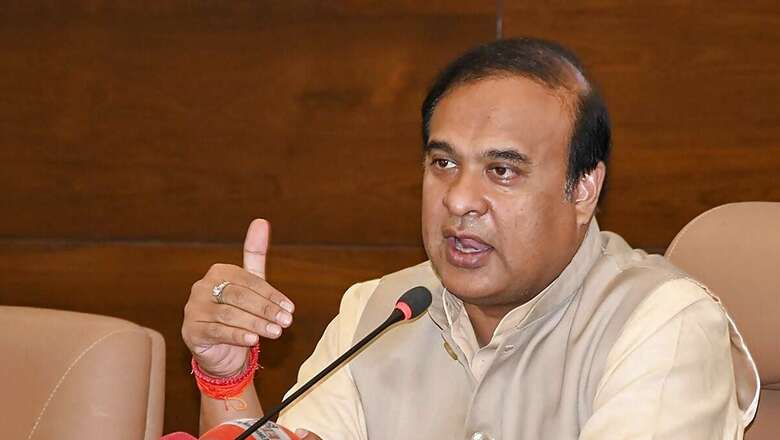
views
In a significant move, the Bharatiya Janata Party-led Assam government on Friday annulled the Assam Muslim Marriage and Divorce Registration Act, 1935, signaling a shift towards implementing a Uniform Civil Code in the state.
Calling the Act as “age-old,” Assam Chief Minister Himanta Biswa Sarma said that this decision marks a step towards prohibiting child marriages in the state.
“On 23.22024, the Assam cabinet made a significant decision to repeal the age-old Assam Muslim Marriages & Divorces Registration Act. This act contained provisions allowing marriage registration even if the bride and groom had not reached the legal ages of 18 and 21, as required by law. This move marks another significant step towards prohibiting child marriages in Assam,” Himanta Biswa Sarma wrote in a social media post on X.
On 23.22024, the Assam cabinet made a significant decision to repeal the age-old Assam Muslim Marriages & Divorces Registration Act. This act contained provisions allowing marriage registration even if the bride and groom had not reached the legal ages of 18 and 21, as required…— Himanta Biswa Sarma (@himantabiswa) February 23, 2024
Assam minister Jayanta Malla Baruah acknowledged that the decision aligns with the state’s efforts to implement the Uniform Civil Code in the state, Hindustan Times reported.
Earlier this month, Uttarakhand became the first state in the country to pass the Uniform Civil Code (UCC) in the assembly; making laws on marriage, divorce, and inheritance the same for every individual in the state.
WHAT WILL CHANGE AFTER THE REPEAL?
Currently, the law allows for the voluntary registration of Muslim marriages and divorces, empowering the Assam government to issue licenses to Muslim individuals for registering these marriages and divorces in the state.
Upon the repeal of this law, those individuals will no longer have the ability to register marriages and divorces.
Additionally, the state’s district commissioners and district registrars will take over the custody of registration records currently held by 94 Muslim Marriage Registrars. To aid in their rehabilitation following the repeal, the government will provide a one-time compensation of Rs 2 lakh each to Muslim Marriage Registrars.
Jayanta Malla Baruah asserted that with the repeal, the state aims to transition all marriages, regardless of religion, to be registered under the provisions of the Special Marriage Act.
“We already have a Special Marriage Act, and we want all marriages to be registered under provisions of that,” Baruah said.
‘ACT NOT IN LINE WITH TODAY’S SOCIETY’
Baruah described the repealed law as “not in line with today’s society,” emphasising that the decision is part of the state government’s commitment to combating child marriage.
“Through this (Act), we would also see underage marriages being registered – of boys below 21 years or girls below 18 years. So this is a big step towards us being able to completely eradicate child marriage,” he added.
As per the 2011 Census, Muslims make up 34 per cent of Assam’s population, totaling 1.06 crore out of the overall population of 3.12 crore.
ALIGNMENT OF UCC WITH POLYGAMY BAN BILL
Assam CM Himanta Biswa Sarma has repeatedly expressed his government’s commitment to introducing the Uniform Civil Code (UCC) in the state, making it a focal point for the upcoming Lok Sabha elections. Simultaneously, Sarma has also been working on working on a bill to criminalise polygamy.
Earlier this month, Assam chief minister announced the introduction of a bill to abolish polygamy in the state during the Budget session. This announcement followed the CM’s statement weeks ago that Assam would become the third state, after Uttarakhand and Gujarat, to implement a Uniform Civil Code.
However, Sarma suggested that the state government is currently working on aligning the Uniform Civil Code (UCC) and the Polygamy Ban Bill. “The Assam cabinet has deliberated on both the anti-polygamy and UCC bills. We were in the process of developing the anti-polygamy bill when Uttarakhand passed the UCC. An expert committee is actively working on aligning these two aspects to bring forth a more robust legislation,” Sarma stated.
Similar to the Uttarakhand UCC Bill, which has excluded the tribal population, Sarma also declared that the state’s UCC Bill will grant an exemption to the adivasis of the state. The BJP government in Gujarat has similarly introduced a UCC Bill and intends to pass it in the state assembly soon.



















Comments
0 comment